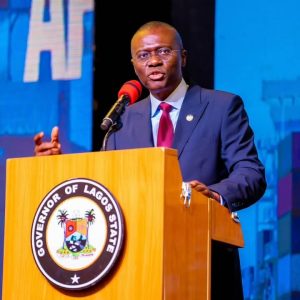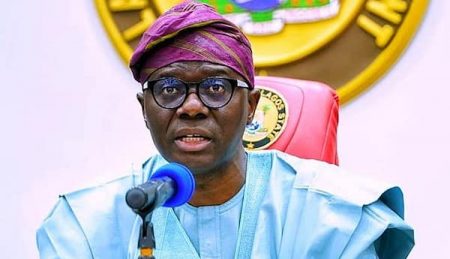Transforming Lagos: Sanwo-Olu’s Silent Masterclass in Urban Governance
By David Badaru

By any sober measure, Lagos is a study in contradictions: a metropolis at once calamitous and catalytic, where congestion rubs shoulders with creativity and scarcity coexists with surging capital flows. To shepherd such a city demands equal parts technocrat, diplomat and evangelist — and Governor Babajide Olusola Sanwo-Olu, for better or for worse in the court of public opinion, has elected to lead Lagos with a disposition that privileges engineered delivery over rhetoric. This essay is an expository inventory and an interpretive reading of his administration’s most salient achievements: infrastructural legacies, industrial interventions, social resilience measures, and institutional instruments designed to remake Lagos into a more mobile, more productive and more inclusive urban polity.
Below I catalogue, with documentary anchoring, the accomplishments that have defined his tenure and the strategic logic behind them. The aim is not to canonize but to elucidate: to show how deliberate policy, when fused to administrative tenacity, can alter the material ecologies of a city home to tens of millions.

Infrastructure as the State’s Most Persuasive Argument
If governance must ultimately be judged by its capacity to alter the daily lives of citizens, then the Sanwo-Olu administration’s infrastructure ledger reads like a sustained argument. In a single recent twelve-month window Lagos commissioned dozens of arterial thoroughfares and several bridges — a reported 61 newly completed roads spanning some 56.52 kilometres and five bridges — while accelerating work on scores of additional road-and-bridge projects across the metropolis. These projects are not cosmetic; they are tactical interventions aimed at reducing travel time, facilitating commerce, and unlocking hitherto moribund neighbourhoods for economic activity.
Concomitant with roadworks is the bold recommitment to rail — the infrastructural DNA of a modern city. The Blue Line Mass Transit, inaugurated into commercial service in phases beginning under this administration, represents a tectonic shift in Lagos’s modal mix. The state has not only begun operations but has also augmented capacity by procuring additional trainsets to expand frequency and relieve platform crowding — a necessary complement to urban railification if behavioural change is to follow infrastructure provision.
These are not standalone projects; they are networked investments. Roads feed terminals; terminals feed rails; rails reconfigure land values and stimulate transit-oriented development. The technical acuity of prioritising connective tissue — bridges, arterial roads, rail corridors — bespeaks an administration that understands metropolitan governance as systems design rather than episodic pothole-fixing.

Industrial Policy and Food Security: The Imota Rice Mill and Agribusiness Strategy
One of the more emblematic projects of Lagos in this era is the Imota Rice Mill at Ikorodu — a capacious processing facility conceived to domesticate rice value chains, reduce import dependence, and stabilise staple prices. Built to industrial scale, the Imota mill has been presented as both an employment generator and a bulwark for food security in a country where rice is a political as well as an economic commodity. Beyond the mill itself, Lagos’s strategy has included plans for backward integration, industrial parks and linkages to paddy-producing states — an approach that treats the mill not as an isolated monument, but as the kernel of an agro-industrial cluster.
Whether the mill’s full potential is realised depends on sustained supply, logistics and supportive federal policies — but the strategic foresight is undeniable: produce, process and market at scale within the state’s jurisdictional reach, thereby converting Lagos’s purchasing power into producer-led value capture.

Economic Inclusion: MSMEs, Credit and the Architecture of Opportunity
An urban economy as protean as Lagos’s requires a plural architecture of financial instruments for small and medium enterprises. Lagos State’s Employment Trust Fund (LSETF) has been a central plank of Sanwo-Olu’s social-economic compact: disbursing credit, training entrepreneurs, and underwriting business incubation. Recent official figures point to robust disbursement volumes and high repayment rates — a signal that targeted public finance, when paired with enterprise development, can catalyse scalable livelihoods across the city. The LSETF’s performance metrics (including high loan-repayment rates) intimate an institutional competence in channeling small-scale capital in ways that preserve fiscal sustainability and expand entrepreneurship.
Put plainly: Lagos’s growth will be sustained not just by mega projects but by tens of thousands of micro-enterprises—shops, artisans, logistics operators—whose viability depends on access to patient capital and market linkages. The state’s programmatic support on this front is consequential.
The Port, Logistics and the Geopolitics of Trade
Lagos’s destiny is maritime. The commissioning of the Lekki Deep Sea Port — a project of continental significance — amplifies the city’s node-value in West African trade. The port’s capacity to handle millions of TEUs, and the attendant promise of jobs and cargo decongestion, is a structural advantage that the state has sought to leverage for broader industrialisation and logistics sector growth. Of course, port success is contingent on hinterland connectivity: rail, highways and customs efficiency. Lagos’s simultaneous investments in rail and roads therefore dovetail logically with its port ambitions.
Public Health, Resilience and Crisis Management
Sanwo-Olu’s tenure has been marked by exigent crises — notably the COVID-19 pandemic and the set of social disturbances that test urban governance — and the administration’s responses have leaned towards infrastructural and institutional readiness. Lagos upgraded isolation and treatment facilities, inaugurated dedicated beds and expanded public-health capacities to manage contagion and preserve public life. While public-health outcomes depend on national systems and civic compliance, Lagos’s rapid scaling of treatment architecture during the pandemic exemplifies a precautionary, operational mindset.
Beyond epidemics, resilience has been embedded in how roads are engineered, drainage is integrated into urban renewal and how emergency response channels are configured — small, technical choices that make cities less fragile.
Digitalisation, Institutional Modernisation and Investment Promotion
A state that wants to attract capital must make itself legible and low-friction to investors. Lagos, under this administration, has rolled out investor outreach, streamlined some regulatory processes and presented the city as a viable destination for both domestic and international capital. Strategic diplomacy — institutionalising trade missions, presenting Lagos on global platforms, and packaging bankable projects — has been pursued with evangelical zeal. Such efforts matter: sovereign perception and project bankability are requisite ingredients for large-scale private capital to co-invest with the public sector in infrastructure and industry.
The Metrics of Delivery and the Political Economy of Expectations
It is imperative to read the administration’s achievements through two lenses simultaneously: technical execution and the politics of expectation. Delivering 61 roads or inaugurating the Blue Line are discrete, verifiable acts. Yet Lagosians’ lived grievances — housing affordability, household electricity access, intra-city commuting costs, and everyday insecurity — are diffuse and persistent. Here lies the political challenge: to sustain the public’s goodwill, infrastructural delivery must be accompanied by visible improvements in the quotidian metrics that citizens actually feel.
The administration has made headway in visible, deliverable projects; the enduring task is to translate those projects into durable reductions in cost-of-living pressure and into accessible services for the city’s most vulnerable.
Critical Caveats — Nothing Political Is Permanent
No encomium is unqualified. The governor governs within constraints — fiscal, federal and geopolitical. Projects like Imota Mill or the Lekki Port require complementary federal policy, regional agricultural cooperation and a stable macroeconomic environment. Rail and road projects require long maintenance horizons and dependable revenue streams. Moreover, the success of pro-business interventions must not occlude the need for robust social protection, participatory urban planning and transparent procurement practices.
Robust scrutiny is thus not an impediment to praise but its complement: public accountability makes public projects more resilient.
A Concluding Synthesis: From Transactional to Transformational
If we perceive governance as the art of aligning resources, institutions and public will around shared, generative outcomes, then Babajide Sanwo-Olu’s Lagos has made discernible strides toward such alignment. There is an administrative temperament at work here — infrastructural imagination married to pragmatic delivery — that has begun to reconfigure Lagos’s material condition: faster roads, functioning mass transit, industrial capacity for staple processing, targeted microfinance and strategic port investments. These are the scaffolds upon which a more predictable, investible and livable Lagos can be constructed.
To be clear: the city remains a work in perpetual progress. Yet there is a salutary lesson in the current administration’s record: when metropolitan governments combine technical competence with an appetite for bold projects, urban transformation ceases to be merely aspirational and becomes implementable.
In the contest of ideas about how to remold African megacities for the 21st century, Lagos under Sanwo-Olu supplies a trove of practical experiments — some already in motion, some requiring refinement — that other cities would do well to observe. The true metric of success will be how these edifices of public policy are sustained, democratised and made to yield equitable dividends for all Lagosians.
David Badaru who is a policy affairs analyst wrote this piece from Lagos.













